“We are the miracle of force and matter making itself over into imagination and will. Incredible. The Life Force experimenting with forms. You for one. Me for another. The Universe has shouted itself alive. We are one of the shouts.”
— Ray Bradbury
“We are the miracle of force and matter making itself over into imagination and will. Incredible. The Life Force experimenting with forms. You for one. Me for another. The Universe has shouted itself alive. We are one of the shouts.”
— Ray Bradbury
When the Greek god Hephaestus learned that Aphrodite, his wife, was having an affair, he forged a magic, invisible net in his sacred smithy. He set the trap over his own marriage bed then pretended to leave town. Aphrodite and her lover Ares dove between the silken sheets. The net fell, held them fast, then Hephaestus burst back in with a seismic, “Gotcha!”
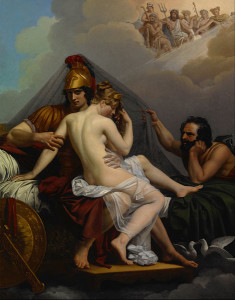 He bellowed for the rest of the Olympians to come witness this travesty. The goddesses declined, giving a self-righteous roll of their ravishing eyes. The gods, on the other hand, dropped everything to race over to Hephaestus’s palace and laugh at the beautiful lovers caught in that glittering net.
He bellowed for the rest of the Olympians to come witness this travesty. The goddesses declined, giving a self-righteous roll of their ravishing eyes. The gods, on the other hand, dropped everything to race over to Hephaestus’s palace and laugh at the beautiful lovers caught in that glittering net.
You see where we’re going. Angry hackers, crafty as Hephaestus, snared 36 million adultery accounts from a site called Ashley Madison, then bellowed for everyone to look at the evidence. They cheated the cheaters, on a scale grand enough to gratify the gods. 36 million accounts, from all over the world. 36 million human beings. 36 million stories. 36 million situations — cries for help, bids for a thrill, boredoms, yearnings, reachings-out in a way that seemed safe. Now there are 36 million reputations at stake. 36 million broken hearts. 36 million families.
What an archetypal mess.
But where there’s an archetypal mess, there’s an archetypal message, right? In this case I’m sure there are 36 million of them.
Aphrodite, the embodiment of Love, never wanted Hephaestus. He tricked her into marrying him through a separate ruse, to which she agreed because she thought it meant marriage to Ares. Hephastus wanted her for his own and no one else’s, regardless of her desires. Love cannot abide such lovelessness. After the episode of the net, Aphrodite and Hephaestus broke up, leaving her and Ares free to see each other as much as they wish. Which they do to this day.
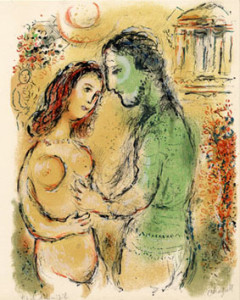 The myth gives us an image of one partner treating the other like a possession, demanding fidelity on principle alone. Love — aka Aphrodite — considers this preposterous. Love knows that love comes first. Love means first and foremost loving the beloved, second and second-most wanting the beloved. If Hephaestus loved Aphrodite, he would not have married her, much less expected fidelity, because he knew she wanted Ares. Ares, by the way, never makes petulant demands. He’s too busy going watery in his magnificent knees every time he sniffs her skin, swooning in dizzy joy at her voice, staggering around in a dazed kind of gratitude that she exists at all.
The myth gives us an image of one partner treating the other like a possession, demanding fidelity on principle alone. Love — aka Aphrodite — considers this preposterous. Love knows that love comes first. Love means first and foremost loving the beloved, second and second-most wanting the beloved. If Hephaestus loved Aphrodite, he would not have married her, much less expected fidelity, because he knew she wanted Ares. Ares, by the way, never makes petulant demands. He’s too busy going watery in his magnificent knees every time he sniffs her skin, swooning in dizzy joy at her voice, staggering around in a dazed kind of gratitude that she exists at all.
The word “fidelity” comes from a Latin word for faith. And doesn’t the massive manifestation of infidelity encoded in the Ashley Madison data create a massive loss of faith on the part of all those betrayed partners? Acting faithlessly destroys faith. But I’ll venture a guess that some of that faith may have been placed in monogamy as a God-sanctioned prerequisite for love. I know I was trained to believe that, but according to Ginette Paris — an author, therapist, and one of my teachers — we have it precisely backward:
“It is quite a natural thing for satisfied lovers to be faithful to one another, without resentment…. This kind of fidelity cannot be promised, it can only exist and one notices it after the fact, a posteriori. When faithfulness is mixed up with control the confusion fogs the transparency of the relationship even more than unfaithfulness. It moves love into the territory of control and kills desire.” — Ginette Paris, “Marriage, Intimacy and Freedom”
In other words, faithfulness, when it happens, arises from mutual love. This fidelity wells from the deepest springs: faith in each others’ beauty, dreams, talents, being, humor, sorrow, struggles, triumphs. Each partner sees and believes in the other’s true self. We’re talking about soul fidelity — a holy, mystical depth of love that turns Aphrodite on like no amount of walking the beach or snuggling beside a roaring fire.
Ashley Madison profits from people seeking more than they have. Its users hunger for Love, and the site’s marketing team crafts a message that seems to offer exactly that. The names even sound similar, with the initial short “a” and the two strong stresses: APH-ro-DI-te, ASH-ley-MAD-ison. Now those customers might find themselves in embarrassing or dangerous situations, but maybe some of them actually had an Aphroditic experience. Who knows.
The forces at play in the myth are still at play today. Call them by other names, castigate them with moral codes, they will not be denied. So it’s comforting that Hephaestus moved on and dealt with his relationship issues. Eventually he married Aglaia, the Goddess of Glory and one of the three Graces. Theirs is a vital and, yes, faithful partnership. They have a bunch of beautiful daughters. Everyone agrees that no matter how painful it was, he had to cast that glittering net. Look at him now, building swing sets and jungle gyms, raising a new generation of goddesses. He never could have done that with Aphrodite. She approaches child rearing in a completely different way. Just ask Eros and Psyche.
“And in turn the Heron asks, with shocking clarity as it flies from right to left and left to right: why can’t our job here on earth be simply to inspire each other?”
— Graham Joyce, August 2014, grahamjoyce.co.uk
One of our nation’s most iconic young male athletes grew up and felt an inner imperative — perhaps a calling — to become a woman in the eyes of society. So he did. He transformed into she, now the nation’s most iconic transgender woman. As part of her debut, she posed for a photo shoot wearing a knockout of a spangly golden gown. Had she attended a ball in that dress, she surely would have lost one of her shoes on the way out.
Caitlyn Jenner’s version of the Cinderella story, like all the others, works with the motif of womanly beauty emerging from a situation where it was not allowed to shine. Hundreds if not thousands of variants of this tale appear around the world. Hers has a particular fascination, though. As a muscle-bound youth, Bruce dominated the Olympic Decathlon then waved the flag in triumph, a uniquely American version of the powerful young male. He showed us how we saw ourselves. Now, from the flat screens of reality tv, Caitlyn steps forward as a uniquely powerful American female. She shows us how we see ourselves today.
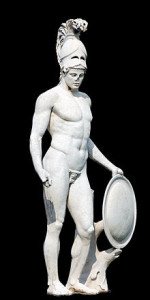 Remember how incredibly beefcake Bruce was? He ran fast and he ran far, he jumped like crazy. He hurled beastly heavy things then roared with exultation. He demonstrated all the attributes of a superb foot soldier. In winning gold for the United States, he wore our national image of Ares, the Greek god of war. He let us imagine ourselves as the world’s greatest, strongest, fastest, best. His muscle was our might. At the same time, his youth was our immaturity. His soul roiled with secret misery. So did ours.
Remember how incredibly beefcake Bruce was? He ran fast and he ran far, he jumped like crazy. He hurled beastly heavy things then roared with exultation. He demonstrated all the attributes of a superb foot soldier. In winning gold for the United States, he wore our national image of Ares, the Greek god of war. He let us imagine ourselves as the world’s greatest, strongest, fastest, best. His muscle was our might. At the same time, his youth was our immaturity. His soul roiled with secret misery. So did ours.
Imagine for a moment that you are the repressed energy / force of nature whom many call The Goddess. Let’s say you fume at the way you’ve been treated by jock jerks like Bruce Jenner over the millennia. You finally say, Enough, casting your divine glance around for someone to carry your message. What more perfect emissary could you find than Caitlyn? Who could embody a more potent image of your beauty and power than she who had once been the greatest male athlete in the world?
At sixty-five, the traditional age of retirement, Bruce withdrew so Caitlyn could emerge. With glamorous dresses, flawless hair, and brilliant make-up, she stepped perfectly and precisely into a mature image of Aphrodite. The Greek goddess of love and beauty, incidentally, took Ares as a lover. As Ares, Bruce waved the American flag. So did we. As Aphrodite, Caitlyn embodies beauty, authenticity, complexity. So can we.
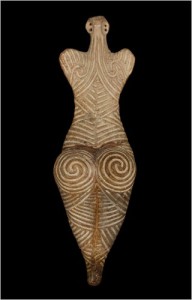 The story also shows an image of a woman with decades of lived experience as a male athlete. Caitlyn carries that in her muscle memory, all the more powerfully because of the power of those muscles. She walks with the bodily knowledge of life and sex and sports as a champion man in the eyes of society. She now gathers into those same muscles the experience of being a woman in the eyes of society. Because of that, she lives and breathes the union of opposites. She joins Cinderella and Prince Charming within herself. She is Aphrodite and Ares, both at once. The Goddess and her Consort. Caitlyn offers us an image of soul totality, of wholeness. If her soul can do that, ours can too.
The story also shows an image of a woman with decades of lived experience as a male athlete. Caitlyn carries that in her muscle memory, all the more powerfully because of the power of those muscles. She walks with the bodily knowledge of life and sex and sports as a champion man in the eyes of society. She now gathers into those same muscles the experience of being a woman in the eyes of society. Because of that, she lives and breathes the union of opposites. She joins Cinderella and Prince Charming within herself. She is Aphrodite and Ares, both at once. The Goddess and her Consort. Caitlyn offers us an image of soul totality, of wholeness. If her soul can do that, ours can too.
In that way her story might help move us past dualistic thinking. Sometimes we look around at this fabulous world, and we purse our lips and say, But is this good or is it bad? Is it light or is it dark? Male or female? Godly or infernal? Those are dualisms. Sometimes, on the other hand, we look around at this fabulous world and say, Wow, the Sky! Wow, the Ocean! Wow, Mountains! Wow, the Sun, the Moon, and the Stars! Wow, People! Love! War! Language! Everything is all just so amazing! This way sees the world as deeply, fundamentally sexy, hopelessly charged with charm and allure.
Monotheism tends toward the first way of thinking, polytheism toward the second. Monotheism loves to judge judge judge, to assign what it deems good-light-male-godly a place in heaven, to reject everything bad-dark-female-infernal and cast it down to hell. Monotheism banishes the sexiness of the world. For anyone associated with banished aspects, this state of affairs constitutes ongoing anguish, and depression so deep that it seems to try to reach down into the underworld and bring back all those lost elements of soul.
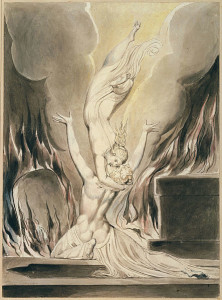 Cinderella stories imagine the soul emerging from that underworld and shining in its own authenticity. They celebrate the beauty of the true self finding its place in the world. Caitlyn Jenner seems to be doing exactly that. She transformed Olympic gold into a golden dress. She acts as an agent of The Goddess. In that capacity, she advocates for the rights and respect due to the transgender community, and for the inner lives of everyone. Her Goddess messages have to do with authenticity, the fluidity of external identity, our vast possibilities for transformation, and polytheistic acceptance and joy rather than monotheistic judgment. She presents us each with the ultimate mythological questions: What is your authenticity? What does your soul want to express? What transformations of body and consciousness would you embark upon, given that you, like Caitlyn, have the strength of the warrior and the courage of the lover?
Cinderella stories imagine the soul emerging from that underworld and shining in its own authenticity. They celebrate the beauty of the true self finding its place in the world. Caitlyn Jenner seems to be doing exactly that. She transformed Olympic gold into a golden dress. She acts as an agent of The Goddess. In that capacity, she advocates for the rights and respect due to the transgender community, and for the inner lives of everyone. Her Goddess messages have to do with authenticity, the fluidity of external identity, our vast possibilities for transformation, and polytheistic acceptance and joy rather than monotheistic judgment. She presents us each with the ultimate mythological questions: What is your authenticity? What does your soul want to express? What transformations of body and consciousness would you embark upon, given that you, like Caitlyn, have the strength of the warrior and the courage of the lover?
“Mythological symbols touch and exhilarate centers of life beyond the reach of vocabularies of reason and coercion.”
–Joseph Campbell, Creative Mythology, page 4
Once upon a timeless time, on an island called Crete in the Mediterranean Sea, there lived a woman named Ariadne. One day she fell in love with a guy named Theseus and gave him a skein of string. Her idea was to have him unspool the string as he wound his way through a labyrinth to kill a monster at the center, after which he would turn around and follow the string back out to safety. Theseus was all for it even though concocting the scheme would have been far beyond his mental powers. Alas, when the deed was done, his valiant but scanty brain cells forgot to take Ariadne with him when he sailed back home to Athens.
Ariadne was standing on the beach, watching the ship disappear and wondering how she had fallen for such an outrageous airhead, when a gleaming chariot swooped down from the sky drawn by a pair of panthers. Holding the reins was no mere pin-up boy, preoccupied with flexing his mortal thews, but instead it was a god. It was Dionysus, one of the twelve great shining ones of the mighty Greek pantheon, and he was thrilled to find Ariadne. He leaped from the chariot, took her hands in both of his, and spoke in a voice that made her bones tingle. Come with me to Olympus, love. That’s where you belong. She replied, Are those panthers?? He gave her a wink and said, They’ll carry us to heaven if you’re willing. She cast one last glance over the empty ocean, turned back to the glory of Dionysus, and then she said, Yes.
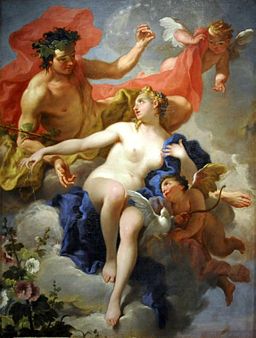 He kissed her hands and off they went. As a wedding present he gave her a fabulous crown which he later turned into stars. As the story goes, they loved each other ever after. You heard that right. Dionysus was the only one of the Greek gods who was able to handle commitment. What’s more, there are those who believe that in earlier times, Ariadne was a powerful goddess in her own right. If that’s the case, the story shows Dionysus raising the diminished goddess back to her rightful status. He’s also the god who gave us the gift of wine. So when you swirl a pinot noir in the belly of a wine glass, you’re swirling more than just a beverage. You’re swirling the spirit of Dionysus.
He kissed her hands and off they went. As a wedding present he gave her a fabulous crown which he later turned into stars. As the story goes, they loved each other ever after. You heard that right. Dionysus was the only one of the Greek gods who was able to handle commitment. What’s more, there are those who believe that in earlier times, Ariadne was a powerful goddess in her own right. If that’s the case, the story shows Dionysus raising the diminished goddess back to her rightful status. He’s also the god who gave us the gift of wine. So when you swirl a pinot noir in the belly of a wine glass, you’re swirling more than just a beverage. You’re swirling the spirit of Dionysus.
Who exactly is this swirling spirit? Well, Dionysus relishes life. He’s fun and he’s intense, with a spontaneity and exuberance that the other gods lack. He’s playful, faithful, raucous, ebullient. And remember, he’s immortal, so all his traits have divine proportions and nothing about him is bounded by time. We’re talking about spontaneity so powerful that it’s a religious experience, exuberance so profound as to become holy, and playfulness so deep as to render the passage of hours irrelevant. Dionysus can lift our moribund moods with his sacred zest, the way he lifted Ariadne.
Wine, however, like Dionysus, is strong, and it’s complex. It’s not a beverage for quenching thirst. It’s an elixir that demands respect. The right amount is an infusion of joy, but too much is a plunge into oblivion and regret. Wine can heighten celebration, stimulate conversation, and deepen friendship, but it can also deaden feelings, darken depression, and damage relationships. Remember the panthers who drew the chariot? Harnessed, they speed the journey of the soul. Unchecked, they can kill. Dionysus demonstrates the knack of harnessing.
 A glass of wine is a living thing, in the literal, biological sense, animated by the microorganisms that fermented the juice. It’s also a living thing in the senses of the imagination, exactly the way Dionysus is, so it doesn’t matter whether you actually drink wine or not. The idea alone honors his spirit and makes it easy to imagine partaking of life with the same enthusiasm as the shining one who cherishes and champions the goddess.
A glass of wine is a living thing, in the literal, biological sense, animated by the microorganisms that fermented the juice. It’s also a living thing in the senses of the imagination, exactly the way Dionysus is, so it doesn’t matter whether you actually drink wine or not. The idea alone honors his spirit and makes it easy to imagine partaking of life with the same enthusiasm as the shining one who cherishes and champions the goddess.
So whether the glass in your hand is literal, imaginal, or maybe even both at once, look into those jeweled tones. Inhale the bouquet. Swirl the wine until it’s dizzy, but most of all, listen. Can you hear the sacred question posed, to you and you alone? Can you hear the invitation? If you’re willing, if you say Yes, then lift the glass. Sip that spirit into yourself and savor the liquid epiphany, because the true gift of Dionysus is that he can take us all to heaven anytime we let him.
“But for those to whom a stone reveals itself as sacred, its immediate reality is transmuted into a supernatural reality. In other words, for those who have a religious experience all nature is capable of revealing itself as cosmic sacrality. The cosmos in its entirety can become a hierophany.”
— Mircea Eliade, The Sacred and the Profane, page 12
“Myths, or mythic moves, open spaces. Rational accounts limit them. This is necessary. Both are necessary.”
– Tom Cheetham, Green Man, Earth Angel, p 9
Unarmed black men have been dying in the streets at the hands of cops who are supposed to protect them. This betrayal of justice, civil rights, and fundamental morality has been going on since forever, but now it feels like things might actually change, and I think it’s in part because of how eloquent and effective so much of the protest response has been. These protests, coincidentally, have also been deeply resonant with the spirituality of the Yoruba people of West Africa, from whom many slaves in the Americas were descended. All the quotes in this post are from a scholar named Robert Farris Thompson, whose work I highly recommend.
The Yoruba might describe recent events as àshe in action. Àshe is difficult to translate into English, but Thompson describes it as “spiritual command, the power-to-make-things-happen, God’s own enabling light rendered accessible to men and women.” In other words, àshe is the capacity to bring about change. It’s active, energetic, and bright.
By itself, àshe is morally neutral. Change can serve all kinds of different agendas. You could even say that the cops who killed Eric Garner and Michael Brown were exercising àshe at the cost of Mr. Garner’s life. Protestors who lie down in public places are also exercising àshe, but theirs has to do with another spiritual value of the Yoruba, this one called itutu. Itutu is also difficult to translate, but it’s a mystic kind of coolness, an unflappable calm, a “transcendental balance.” It’s associated with the colors blue and green, so it’s quieter than àshe, more contained, darker. It isn’t active so much as it is reflective and receptive. The expression on this sculpture is a great example of what a person with itutu looks like:
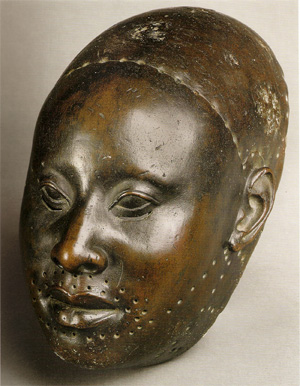
The Yoruba have rituals to restore coolness to situations that have grown too hot. The rituals often involve water and fresh herbs, and they seek to access “the divine source of the power to heal,” or “the center from which all harmony comes.” This divine source, this harmonious center, is, quite simply, love. One person can cool the heart of another through love, restoring her to serenity. A group can calm another group through love, and loving wisdom can even cool an entire nation. Yoruba coolness also links healing with good government.
So far we have àshe, or the capacity to change the world, and we have itutu, or the mystic blue coolness of wisdom and love. Light and dark, hot and cold, active and receptive. Each of these dualities begs for balance. But now let’s add one more ingredient: generosity. For the Yoruba, generosity is the highest form of morality, and good character combines coolness and gentle generosity. What happens when we put it all together? Thompson says:
To the degree that we live generously and discreetly, exhibiting grace under pressure, our appearance and our acts gradually assume virtual royal power. As we become noble, fully realizing the spark of creative goodness God endowed us with… we find the confidence to cope with all kinds of situations. This is àshe. This is character. This is mystic coolness.
This is also spiritual maturity. It’s missing in a justice system that protects institutionalized homicide. It’s missing in an economic system that widens the gap between rich and poor by under-taxing corporations and rich individuals, and by refusing to raise the minimum wage. This system promotes poverty, which promotes crime, which promotes racism and police brutality. It suffers from a lethal deficiency of itutu and generosity.
But change is stirring, right now. By lying down in public places, raising their arms in the air, and using the words “I Can’t Breathe,” protestors are mirroring back to the police, the nation, and the world what is going on. A mirror is receptive and reflective. It reports what’s in front of it calmly and coolly. It has itutu. The action, or àshe, of these protests is guided by that wisdom, and as a result the protests send a profoundly powerful and moving message, and all of us watching the news fall in love with all those gorgeous protestors. This is not to say there is no rage involved. Far from it. Rage fuels the action, and wisdom channels that energy into spine-tingling, galvanizing communication.
Video cameras can also balance àshe and itutu. Like a mirror, a camera is calm and receptive, and it records action so that cool heads and hearts can make wise decisions about how to deal with it. Body cameras on cops might help, but not if it’s cops who decide when to push the “record” button. I’m thinking more of smartphones and social media. Unlike any other time in history, basically all bystanders have the technology in hand to record high-quality evidence of police action and make it available to the world instantly. Also, by “cool heads and hearts,” I mean independent prosecutors for police crime. Àshe can’t be expected to regulate itself, and if it flares out of control, the restorative wisdom of itutu needs to come from an outside, unbiased perspective.
At this point àshe and itutu have worked their way into my imagination, and the imagination is a conduit for change, the way wire carries electricity: first your ideas change, then you start acting on them and turning them into reality. In this case the electricity behind the words àshe and itutu is changing the way we respond to state-sanctioned murder. Now it’s time to imagine that electricity making this nation a place where the Declaration of Independence is as true in practice as it is in spirit, and black men really do have full rights to Life, Liberty, and the pursuit of Happiness. Because YES #BlackLivesMatter, and YES this bullshit from the cops has got to stop.
Once upon a time awhile ago, I downloaded the dating app Tinder and set about swiping through photos of Gentlemen and Neanderthals. The next day, one of my “matches” texted. He was more articulate than the knuckle-draggers out there, but it seemed we weren’t going to connect. I thought, Whatever, and I didn’t text him the following day. The day after that, he sent this:
“Dear Daphne, I want you to know that i understand you try to maintain a respectable distance, but remember what happens: ‘a heavy numbness seized her limbs, thin bark closed over her breasts, her hair turned into leaves, her arms into branches, her feet so swift a moment ago stuck fast in slow-growing roots, her face was lost in the canopy. Only her shining beauty was left’ your choice is to face my ardor or become arbor. Yours in hot pursuit, Apollo”
Well. I don’t receive texts like that every day, let me tell you. He made me laugh, that’s 10 points right there; he cited a book, that’s another 10 for a total of 20 so far; and the book he cited was Ovid’s Metamorphoses, for a cool 10,000 points, enough for him to sail past the threshold required for a return text, with even a few points to spare. It was like the old Olivia Newton John song: “Let’s get mythical, mythical, I wanna get mythica-a-a-l…”
So yes, let’s get mythical. Especially since “Apollo” typed only seven lines of a five-page story. What he left out is that, having just slain the Python, the Roman god Phoebus (Apollo to the Greeks) swaggers around with his bow and arrows and makes fun of Cupid’s arrows for merely being able to “spark a bit of love.” Cupid takes umbrage at the sun god behaving like such a jerk and shoots two arrows: a golden one at Phoebus to fill him with love for the nymph Daphne, and a lead one at Daphne that makes her reject love. Phoebus chases, Daphne runs, and just when he’s about to grab her, she prays to her father, a river-god, to change her shape. Dad turns her into a laurel tree, but Phoebus loves her still. He kisses the tree and claims it as his own, and declares that it shall never drop its leaves the way other trees do, but will always keep its loveliness.
Juicy stuff. But the story is not about humans, right? In the text, the characters are taller than mortals and more beautiful. Their skin glows and their eyes don’t just reflect light but actually shine. They represent deep energies at work in the psyche. They are inhabitants of the domain of soul, aka the imaginal realm.
In this place of larger-than-life and more-than-real, Cupid is the god of love, or, the energy of divine love. This energy operates from above — outside the scene of most of the action. And don’t powerful forces sometimes work on us from outside? Phoebus, meanwhile, is a god of light, shot by a golden arrow (bright, beautiful, incorruptible) which gives him a passion for connection. And yet he moves around on the ground, so he is an image of the divinity of earthly love. Daphne is a nymph, a nature spirit, and she is shot by a lead arrow (dull, heavy, toxic) which fills her with alarm at the thought of connection. She is an earth-dwelling ego driven by empty fears that slow her down and stop her in her tracks.
Those are the players. Here is their play: Cupid (divine love) sets in motion a scenario where Phoebus (earthly love) pushes Daphne’s (the ego’s) resistance to the breaking point. Phoebus won’t take no for an answer, because sometimes the soul doesn’t care about the ego’s fear. And what happens then? Transformation! Ego can handle only so much of its own nonsense before it’s ready to change.
So Daphne turns into a tree. A tree? Yes, a tree! In a forest, a tree’s leaves and roots mingle with those of the other trees all around, exchanging chemical messages and forming a network of connections. Trees also connect heaven and earth: they take sunlight from above, turn it into sugar, and send it down into their roots; they take water from the soil and send it up into the leaves, where it evaporates into the air. Trees are a profound image of connectedness, side to side and up and down. That’s what Daphne turns into: a connected being.
Where are we so far? Divine love makes earthly love push the ego into an experience of its own connectedness. And then, when the ego transforms, the eternal radiance of the soul remains — eternal not in the sense of a clock that will keep running forever, but eternal in the sense of timelessness, of This, Right Here, the boundless Now that is the Always and the Ever. It’s the space where trees are beautiful, and where we’re present enough to realize it. That’s where Phoebus sees Daphne’s real beauty.
Phoebus changes too. For one thing he will probably think twice before making fun of Cupid again, but also the golden arrow pushes him into a deeper experience of love. Initially he just wants a hot date, but at the end of the story he loves Daphne’s essence, and his love is now nourishing; it’s a feast of photons that feeds her leaves every day. Although we should note that it was shining on her all along, regardless of her ability to relax and enjoy it.
I do wonder about Cupid’s take on the whole thing. Does he look down with self-satisfaction? Does it play out the way he knew it would, or does the tree thing surprise even him? By watching the events unfold, does he participate in them through his imagination, the way we vicariously experience our fictions? The way we participate in the great powers through our mythologies?
And what does all of it have to do with “real”-world relations? Maybe nothing. Divine energies roil and churn through us, but we’re also just people, with all our flaws and beauties. Then again, to glimpse the events of the world through the filter of myth a) is so much fun! and b) can open up the possibility of revision. Myth is always subject to rewriting, and recognizing the pattern at play is the first step in trying something different, such as pulling out the lead arrow and soaking up a little sunshine. Who knows how the story might go then?
All of which brings us back to “Apollo.” I should have sent him the preceding paragraphs the minute his message showed up, all in one gigantic text. Believe it or not, that might have simplified things! Instead I thought, Hmph! He thinks he’s a god and I’m a nymph? And I’m going to turn into a tree if I don’t cavort? We will see about that! Which meant the game was on. We met for lunch.
My mythology fetish didn’t seem to frighten him, but then again I didn’t unleash it all at once. At this point, though, we can consider it unleashed. The key thing now is that I have the intel I’ve needed all along for world domination. If anyone out there has any idea how to program things that will work on phones, let me know. It’s time to build a Mythic Tinder.
“Reason and understanding must unite with unreason and magic.”
– Claire Dunne, “Carl Jung’s Red Book,” Parabola, 35:2
“Image-making is a via regia, a royal road to soul-making. The making of soul-stuff calls for dreaming, fantasying, imagining. To live psychologically means to imagine things…”
– James Hillman, Re-Visioning Psychology, p 23
Q: Oh my heck. Am I ready for this?
A: Yes your heck! You are so ready for this. Here, have a latte. That’ll fortify your spirits.
Q: But isn’t it all singing and dancing Mormon missionaries?
A: Yes yes yes! And so much more!
Q: All right, all right. I’m ready. Tell me who among us should see this show.
A: Everyone! Absolutely everyone, all over the land. By which I mean everyone except Mom, due to extremely naughty words and extremely naughty deeds, all enacted with extremely naughty, gleeful abandon. I’m thinking in particular of the Spooky Mormon Hell Dream, which includes a marvelous scarlet Lucifer and giant dancing Starbucks cups. (How’s that latte? Sinfully rich? Wickedly energizing?)
Q: Luci-who?… What on earth are you singing?
A: “Salt–a-Lake–a-Ci–ty, where life is–n’t shit–ty…”
Q: Jesus.
A: Yes, him too! But this is Jesus like you’ve never seen him. He marches around in a glowing white robe, clearly having a terrific time. He tells one of our heroes to quit being such a dick, and he inspires another hero to man up and grow a pair.
Q: He can’t say stuff like that!
A: Hello, he’s Jesus! He can say whatever he wants! And he obviously relishes the potent imagery of male genitalia. (Get it? Potent imagery?)
Q: For pity’s sake. Is nothing sacred?
A: It’s all sacred! This show pulls off the ultimate religious feat: it suspends judgment. It sets aside both approval and disapproval, and instead celebrates human weirdness by singing and dancing and swearing like a sailor. Most of all, it is just so fucking funny!!
Q: And evidently its potty-mouth vocabulary is contagious. Well isn’t it time for one of your diatribes about liminal zones or the numinosum or similar?
A: I’ll do better than a diatribe. I’ll bear my ex-Mormon testimony that this show is doing God’s work here on earth, and I am not even kidding. The story is all about myth-making and the collision of myths; it engages in myth-making of its own; and it allows myth to be spiritual and silly, both at once. Did I mention that the villagers teach the missionaries about metaphor, and about not taking scripture literally? I literally felt dizzy with joy.
Q: …Okey-dokey. That was the last of my latte. We’re done here, yes?
A: Yes, as soon as I send a great big MWAH to Trey Parker, Matt Stone, and every single player in every single cast and crew, for channeling such affectionate and rambunctious Trickster energy. They’re culture heroes, one and all. I never thought I’d hear myself say this, but Viva la Book of Mormon!
Q: Sorry, no French movies. I’ve had bad experiences with French movies.
A: Relax, it’s Beauty and the Beast. You love Beauty and the Beast.
Q: In black and white? From the olden days when there was no such thing as CGI?
A: Yes, when there were such things as imagination and Jean Cocteau. Besides, the world didn’t magically become a magical place with the advent of modern film technology. Did Shakespeare’s vision rely on computers? Charlotte Brontë’s?
Q: I know the story. It’s about seeing with the eyes of love, check. Why watch it again?
A: Oh I don’t know, maybe because IT’S AWESOME! Plus this version has its own delicious details, trust me. And it’s not just about seeing with the eyes of love. It’s also about embracing enchantment, and having the courage to live your own life, and —
Q: Yes, but —
A: But what? Why are you being so difficult about this?
Q: It’s a romance. Romance is not the stuff of serious minds.
A: Wha — serious minds? Seriously?? Whence this drivel? Shall we discuss what Shakespeare and Brontë did with the tropes of romance? Didn’t they have serious minds? And didn’t their serious minds know how to relax and have fun too? Wait a second — are you afraid of what people will think if you talk about a romance? If so, you really need to watch this movie. You’ll see what happens when you care too much about what people think. You lose the key to the treasure house.
Q: I’m not afraid of what people think!
A: Prove it. Put the disc in the computer and press play. Right now. NOW!
Q: Fine! Geez! Bossy Bessie… Wow, that is a hairy beast.
A: He’s a heads-up for the uninitiated, an advance memorandum that men can be disconcertingly furred. Like, all over.
Q: By that logic, men have claws too.
A: Or, claws can be illusory and cause illusory fear, when actually things are fine and wonderful.
Q: Is it illusory that the Beast holds Belle hostage?
A: It’s an image. Think of the Beast as the outer self, wounded and distorted by life in the world, and Belle as the inner self, the incorruptible soul. The outer self (Beast) mistakenly keeps the inner self (Belle) prisoner at first because it knows it needs the inner self to survive. Meanwhile the inner self is shocked by what the outer self has become but learns that the two of them are the same — Belle discovers her own beastliness as well as the Beast’s beauty. And then, Houston, we have the inner union! Yin and yang, heart and mind, light and shadow, together at last, glory glory all day long.
Q: Shhh, please! These subtitles are not going to read themselves.
A: (But it’s also a romance and love conquers all.)
Q: Did you see that? The Beast just called Belle “strange.” Isn’t he supposed to call her the sun in his heaven, or some such? Are you sure this thing is a romance?
A: “You are a strange girl, Belle,” he says, “a strange girl indeed.” Translation: she’s authentic, she’s her true self, she doesn’t conform. He sees who she is and that’s who he loves. What’s more romantic than that? Come on, admit it, you love this movie.
Q: I admit nothing. And I still say it’s about seeing with the eyes of love, check.
A: You’re absolutely right. It’s all about seeing with the eyes of love. Check.
From The Trickster in West Africa: A Study of Mythic Irony and Sacred Delight, by Robert D. Pelton:
The trickster speaks — and embodies — a vivid and subtle religious language, through which he links animality and ritual transformation, shapes culture by means of sex and laughter, ties cosmic process to personal history, empowers divination to change boundaries into horizons, and reveals passages to the sacred embedded in daily life.
From Alchemy: An Introduction to the Symbolism and the Psychology, by Marie-Louise von Franz:
Psychologically here, there is what the alchemists call the union of the cosmic world, which means getting beyond the microcosm of the human being and being open to life itself, in itself — to be related to the whole of life through watching the process of synchronicity.
From Divine Horsemen: The Living Gods of Haiti, by Maya Deren:
In Voudoun the cosmic drama of man consists not of a dualism, a conflict of the irreconcilable down-pull of flesh and the up-pull of spirit; it is, rather, an almost organic dynamic, a process by which all that which characterizes divinity — intelligence, power, energy, authority, wisdom — evolves out of the flesh itself.